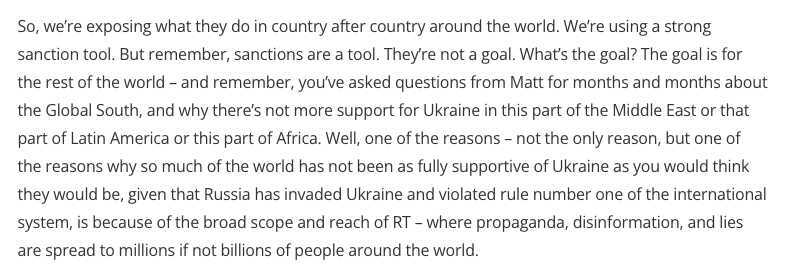The Oleaginous Jamie Rubin And RT
Here is Jamie Rubin yesterday trying to justify the launching of the global war against @RT_com.
Thanks to RT, apparently, the world isn't as supportive of the US proxy war is Ukraine as it should be. If only RT didn't exist, the world would be lining up behind freedom-loving, national sovereignty-loving US. Never mind the innumerable instances of US aggression against Iraq, Syria, Libya, Yugoslavia, etc.
Jamie Rubin, the former Madeleine Albright flack who claimed in April 1999 that the Serbs had executed 500, 000 Kosovo Albanians, is one of the worst liars to have ever worked for the US government--and that really is saying something.
On April 23, 1999, NATO bombed Radio Television of Serbia headquarters in Belgrade. Sixteen civilian technicians were killed. The Rubin gang exulted that NATO had hit Milošević's propaganda apparatus. Rubin himself defended NATO's action, stating that RTS was "part of the apparatus that keeps [Milošević] in power and supports the military campaign." Rubin claimed that RTS was "spreading disinformation that fueled ethnic tensions and justified atrocities committed by the Yugoslav government."
Rubin boasted that NATO's bombing was a legitimate military action aimed at disrupting Milošević's control over media and communication. Does all that sound familiar? Rubin has been nothing if not consistent. He has always sought to crush--literally--all sources of news unfavorable to the US government.
As it turned out, Rubin's exultations were an embarrassment to NATO. NATO's lawyers pointed out that, while RTS may have been a "propaganda" outlet, that didn't make it any less a civilian target. Bombing RTS was thus a war crime. In the coming days, NATO had to distance itself from Rubin and to proclaim that RTS was integrated into Yugoslavia's command-and-control system, and was thus a legitimate military target.
Needless to say, NATO provided no evidence for this new claim. And it took NATO more than three weeks to come up with this new justification for its attack, and was ludicrous on its face. How could the RTS office building in Belgrade be part of Yugoslavia's command-and-control apparatus?
What military objective did NATO’s attack on RTS achieve? Following the bombing, RTS was off the air for a grand total of three hours. International humanitarian law is quite explicit on the issue of proportionality: Article 51(5)(b) of Protocol I of the Geneva Conventions prohibits attacks “which may be expected to cause incidental loss of civilian life, injury to civilians, damage to civilian objects, or a combination thereof, which would be excessive in relation to the concrete and direct military advantage anticipated.”
Sixteen deaths for the sake of a three-hour interruption would surely merit the characterization of “excessive.” Moreover, if RTS were such an important military target, why didn't NATO ever try to attack it again?
In April 2009, on the 10th anniversary of the RTS attack, Sian Jones, Amnesty International’s Balkans expert, said that “The bombing of the headquarters of Serbian state radio and television was a deliberate attack on a civilian object and as such constitutes a war crime.”
He went on to say, “Justifying an attack on the grounds of combating propaganda stretches the meaning of ‘effective contribution to military action’ and ‘definite military advantage’—essential requirements of the legal definition of a military objective—bey- ond acceptable bounds of interpretation. Even if NATO genuinely believed RTS was a legitimate target, the attack was disproportionate and hence a war crime.”
Thus, Jamie Rubin, the would-be arbiter of what constitutes journalism and what constitutes "disinformation."
















